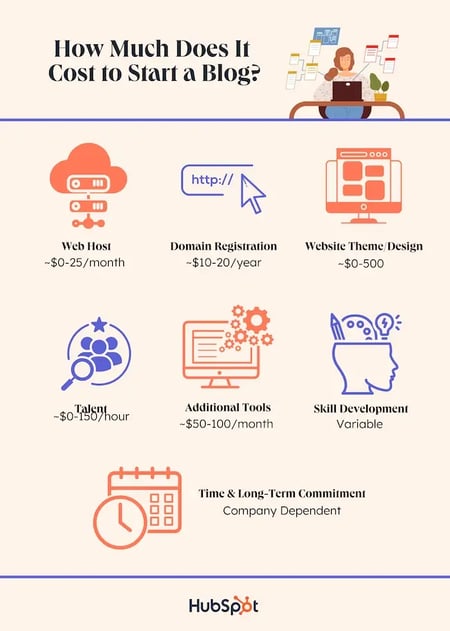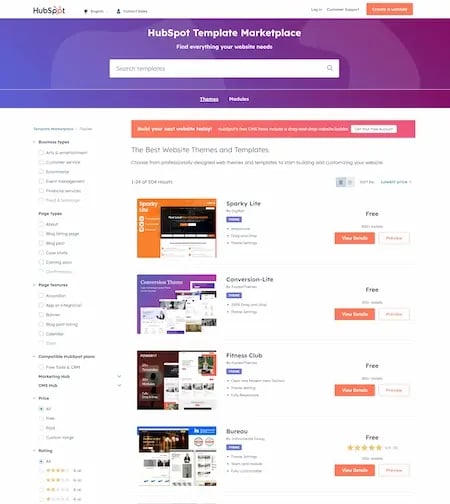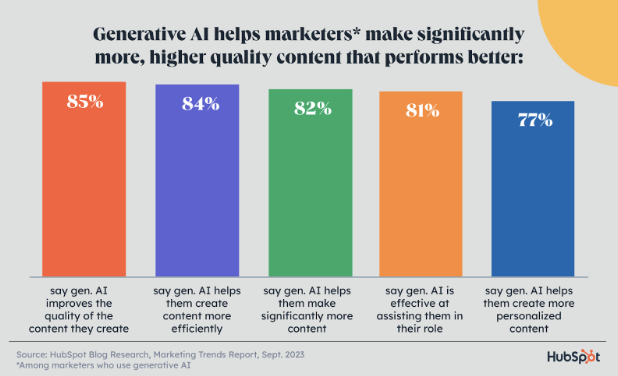Our view at Stack - Simplify growth with an all-in-one platform. Powerful marketing, sales, and support automation. Integrated CMS. Scalable software. Crafted for customer experience.
Confession: I’m squatting on probably 10 different blogs and even more URLs. What can I say? This marketer gets a bit idea-happy — but how much does it cost to start a blog that I can afford this quirky habit?
Lucky for people like me, starting a blog costs next to nothing, which is surprising considering its power. 
Blogs are still one of the most effective ways to share thought leadership, drive traffic to a website, build a brand, and market a business today. And in my day, I have started and successfully managed many with little to no budget.
I know what it takes to get one off the ground and fly it to the top of Google without breaking the bank. So, let’s talk. I’ll break down how much it costs to start a blog and unpack some tips on keeping the price low.
The (Brief) State of Blogging in 2024
Blogs (a shortened form of the phrase “web logs”) first appeared in the late 1990s. At the time, they were limited to hosts like LiveJournal and topics like entertainment fandoms. But today, the landscape looks a little different.

Image Source
Tumblr — where I turn for all my blog minimum viable products like the one below — hosts over 600 million blogs alone. By comparison, WordPress is believed to host over 60 million.

Image Source
Huffington Post, TechCrunch, and Engadget are trusted news outlets and sources of information. And, most impressively, 90% of businesses use blogs to achieve their marketing goals.
Blogs are no longer just internet havens for niche communities. They’re powerful media voices and reliable marketing mediums. So, how much will it cost for you to start capitalizing on one?
How much does it cost to start a blog?

Honestly, you can start and maintain a blog with literally no money down. I’ve done it many times.
But things get more complicated when you scale your operation or integrate it into a larger strategy (e.g., setting up a blog subscription or generating leads).
It’s like a car. Sure, you get everything you need to function at the lowest price point. But the cost goes up if you want extras like a sunroof, leather seats, or — my favorite — a heated steering wheel. As you want more than just the basics, you have to spend more.
That said, the cost of having a blog can vary depending on your specific needs, but getting started is roughly the same for everyone.
I can include a lot here, but Iet’s cut the fluff. Based on my 10+ years of experience, here is a breakdown of the true non-negotiable costs of starting a blog.
Upfront Costs of Starting a Blog
Web Host
Estimated Cost: ~$0-25/month
A blog exists on a website, so you can’t have one without a web host. Thankfully, there are dozens of free web hosts and blogging platforms available today, including:
- Tumblr
- Blogger
- WordPress (paid plans beginning at $4/month)
- Medium
- Substrack
- WIX
All of these will give you a free place to publish your content and build an audience. However, they do come with their share of trade-offs.
For instance, some don’t allow much customization in terms of design and user interface (i.e., Substack and Medium). Others come with a long, clunky subdomain (e.g. WIX).
Some also have usage limits or are prone to security issues (looking at you, WordPress).
Pro Tip: You can set up a blog for free using HubSpot’s Content Hub. With it, you get tons of customization options as well as free marketing, sales, and service tools.
For more flexibility and security, you may want to opt for a paid web host. These typically cost between $3 and $30 per month. Some of the most popular are:
- Bluehost (starting at $2.95/month)
- GoDaddy (starting at $5.99/month)
- Squarespace (starting at $25/month)
Several of the free platforms we mentioned earlier also offer monetization and premium features with paid plans.
Domain Registration
Estimated Cost: ~$10-20/year
If you start a blog paying for nothing else, let it be your domain registration.
A unique or branded domain gives you a short and memorable URL for audiences to visit. It also helps establish awareness and credibility for your brand.
Think about it. Sending someone to “ramonasukhraj.com” (still pending) has a much bigger impact than saying go to “webhost.com/site/ramonasukhraj051101” right?
A custom domain shows you’re starting your own foundation, not just building on someone else’s.
Many web hosts we mentioned offer domain services. If you register yours separately, the price tag will vary on your choice. But generally, it’s pretty affordable.
For example, a dot com on Bluehost costs around $12.99/year, but a dot net on GoDaddy could be as low as $0.01 for the first year.
HubSpot Chief Technology Officer, Dharmesh Shah, ran “wordplay.com” on his domain appraiser on agency.ai recently, showing just how much things can range:
But this is an extreme. Considering variations, it’s safe to estimate that domain registration will cost about $10-$20 per year.
Website Theme/Design
Estimated Cost: ~$0-500
If your platform allows for customization or you’re building your own website, a theme or template can help give you a running start.
Like a domain, a unique theme is a highly effective way to affirm your brand and have more control over user experience.
Many of the hosts I mentioned offer free templates/themes (including HubSpot), but you can also purchase premium themes with advanced functionality on ThemeForest.

Image Source
This can cost anywhere from $2 to $10,000, but like domain names, this is extreme. You’ll find that most premium themes suitable for a blog are around $200-500.
Talent
Estimated Cost: ~$0-150/hour/person
If you’re a solopreneur doing it all on your own, you can add $0 to your tab for talent. However, if you have a larger venture, help may be in order.
Let’s say you want to publish at a high volume or you haven’t already delegated blogging to a team member. You will need to hire a writer or content creator. If you have a complex web experience, you may need a designer and/or developer.
Hiring professionals in these areas with a conservative 3-5 years of experience can cost you about $15-40/hour or $15-150/hour, respectively.
Hidden Costs of Starting a Blog
At this point, you can certainly just drop everything and start publishing. But as you get going, I wouldn’t be surprised if you realized there are some incidentals you may have overlooked.
Tools, Software, and Equipment
Starting a blog may call for additional tools to supplement your blog’s functionality, increase security, or even improve content quality.
This may include but is not limited to:
- SEO Tools
- Analytics
- Editing/Writing (i.e. Grammarly)
- Multimedia Plugins/Integrations
- Camera Equipment
- Video Editing Software
- Graphic Design Software (i.e. Adobe Creative Suite or Canva)
- Social Media Scheduling Tools (i.e. Buffer)
- Email Marketing Tools (i.e. MailChimp)
These items may not be make-or-break, but they can help take your blog’s performance to the next level. Costs will vary depending on specific vendors and features, but make sure you research and account for them.
Skill Development
If you’re in the tech space for the first time, blogging may come with a great deal of new skills to learn (or sharpen).
Aside from the obvious writing and editing, you may need to learn a bit about search engine optimization, social media marketing, conversion rate optimization, user experience, and even code.
In many ways, these skills are like the additional “tools” on our list. You can start a blog without them, but having them in your toolbelt makes success much more attainable.
Time & Commitment
Now, here’s the biggy. Financials aside, the biggest investment you make when starting a blog is time.
Time for writing, research, editing, interviewing, strategizing, staging, optimizing for search, and promoting. Time to learn new skills and keep your finger on the pulse of your industry and audience.
And this isn’t limited to just when you’re getting started. It is a consistent habit.
Blogging is a full-time job and a long-term strategy that requires commitment. One of my previous employers had been blogging for nearly five years before it started seeing the organic traffic and high ranks in Google they set out for.
Whether you’re a team of one or many at an organization, you must be ready to dedicate this time to see results.
Learn more about using HubSpot for Blogging in our Free Academy Course.
How much does it cost to maintain a blog?
While many of the big-ticket items like your website theme are one-time or annual investments, most are recurring monthly expenses.
Again, many hosts offer “free publishing forever,” but add-ons will cost you.
In my experience, you’ll want to make sure you have an email marketing and social media publishing tool in your arsenal — at a bare minimum. That said, I would say plan on dedicating a minimum of roughly $50-100 a month to maintain your blog long-term.
How to Start a Blog for Free (or Almost)
Now, time is one expense you can’t avoid, but you can very well cut costs in other areas when starting a blog. How, you ask?
Lean into free tools.
There is no shortage of free tools available to start and maintain the basic functions of a blog — writing, publishing, and hosting.
Leaning into them will help you lay the foundation for a successful blog. You’ll also be able to test things out before making a big monetary investment.
Some free tools I have used and recommend:
- Blogging: Tumblr, HubSpot, Medium
- Design: Canva
- Video Editing: CapCut
- Social Media Scheduling: HootSuite, Buffer
- Email Marketing: MailChimp
- Leading Code: Codecademy
Supplement efforts with AI.

HubSpot’s 2024 State of Marketing Report found that 81% of marketers who use generative AI say it’s effective at assisting them in their role. How exactly? Well, specifically, they reported it helps them:
- improve the quality of the content they create (85%).
- create content more efficiently (84%).
- make significantly more content (82%).
- create more personalized content (77%).
In other words, they’re supplementing their content efforts with AI, not replacing them.
I’m a writer, and I will never tell you to let AI entirely create your content for you, considering the risks of plagiarism and other concerns. But AI truly can help you be more efficient and cost-effective, especially if your operation is lean.
Need an image for a blog? There’s Adobe Firefly and several AI image generators to help instead of designing one or hiring someone to do so.
Stuck on blog titles or topics? Try HubSpot’s free blog title generator.
How about an outline for an article? HubSpot’s free AI content writer can help.
Need suggestions on how to improve a piece? Run it through ChatGPT.
Supplementing your content creation efforts with AI tools like these can help you cut talent costs and move more quickly.
Blog With Benefits
So, there you have it: a straightforward, no-nonsense breakdown of how much it costs to start a blog from someone who’s done it an embarrassing number of times.
Starting a blog shouldn’t be an expensive initiative, but it should be a fruitful one. With everything I outlined in this article, you’ll be well on your way to crushing your brand awareness, traffic, leads, and sales goals.

![]()
If Hubspot is of interest and you'd like more information, please do make contact or take a look in more detail here.
Credit: Original article published here.
